In every language, including Welsh, there are certain expressions that people tend to use over and over again when speaking.
Below you can find ten expressions you’ll come across on a regular basis in colloquial Welsh. By mastering these expressions, not only will you be able to carry on a more natural conversation in Welsh but you’ll also be able to impress all your friends! 😃 I hope you enjoy using them!
1. Be’ sy’n bod?
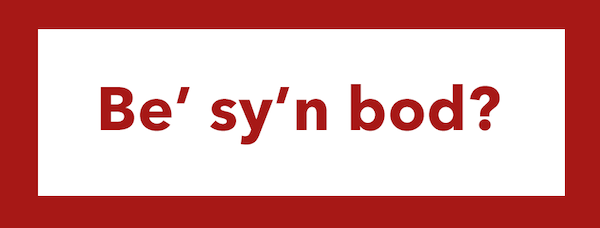
Meaning in English: What’s up? What’s wrong? What’s the matter?
“Be sy’n bod?” (“Beth sydd yn bod”) is used all the time in Welsh when you want to show concern for someone who appears to be upset or troubled. It is often shortened to just “Be’ sy’?”
If you add the preposition “ar” at the end to make “Be’ sy’n bod ar ___?” it translates as “What is wrong with ___?”
Examples:
- Be’ sy? Ti ‘di gweld gôst, neu rwbeth? = What’s the matter? Have you seen a ghost or something?
- Be’ sy’n bod arnat ti? = What’s wrong with you?
2. Siŵr o fod
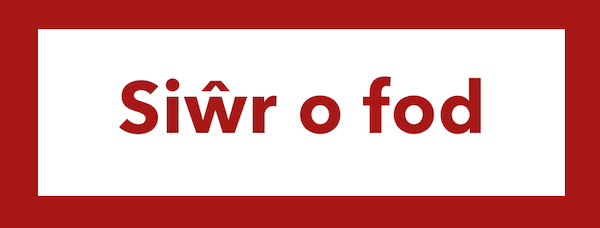
Meaning in English: Probably, most likely, I expect so
An expression you’re bound to hear quite often is “siŵr o fod” which, despite containing the Welsh word for “sure,” is actually closer in meaning to “probably” in English. It is often stuck onto the end of sentences, but can occur mid-sentence as well.
Examples:
- Dach chi’n siŵr o fod yn cofio mor galed y buon ni’n gweithio. = You probably remember how hard we worked.
- Fyddi di yno nos Lun? – Bydda’, siŵr o fod. = Will you be there Monday night? – I will, most likely.
3. Paid poeni / Paid becso
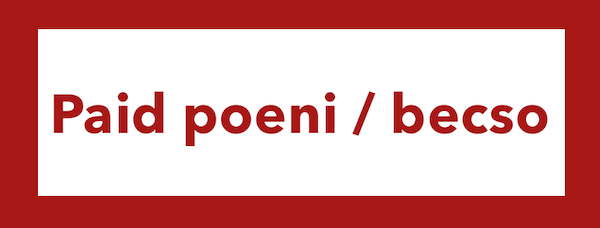
Meaning in English: Don’t worry!
A phrase many learners become familiar with right away is “paid â phoeni” (in the North) or “paid â besco” (in the South). You can shorten these to “paid poeni” and “paid besco” respectively in colloquial Welsh. (In fact, some speakers no longer use â in speech.) If you are talking to a group of people rather than just one person, simply replace “paid” with “peidiwch”!
Examples:
- Paid poeni am y ci. Mae o’n gwella. = Don’t worry about the dog. He’s getting better.
- Paid becso, Philip. Dw i’n gwybod beth i wneud. = Don’t worry, Philip. I know what to do.
4. Wrth gwrs

Meaning in English: Of course
Figuring out the derivation of this phrase is not difficult, as it sounds very similar to the English “of course”! Plus it is used in the exact same way as in English.
Examples:
- Dach chi’n fodlon fy noddi i? – Ydw, wrth gwrs. = Are you willing to sponsor me? – Yes, of course.
- Wrth gwrs bod Rhys eisiau chwarae. = Of course Rhys wants to play.
5. A dweud y gwir
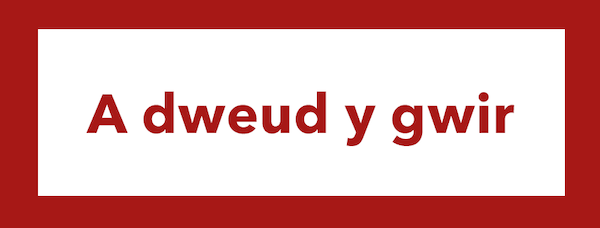
Meaning in English: To tell the truth, to be honest
They say that honesty is the best policy, which is why the phrase “a dweud y gwir” is so handy. Just as in English, it can accompany an admission of guilt/ignorance, be used to soften an unpleasant response, or make your criticism of something appear less strong.
Note that you might also hear “i ddweud y gwir” depending on who you speak to.
Examples:
- Dw i ddim yn siwr, a dweud y gwir. = I’m not sure, to tell the truth.
- Wyt ti eisiau mynd i’r sinema? – Wel, a dweud y gwir, dw i ddim yn hoffi ffilmiau. = Do you want to go to the cinema? Well, to tell the truth, I don’t like films.
6. Yn union! / Yn hollol! / Yn gwmws!
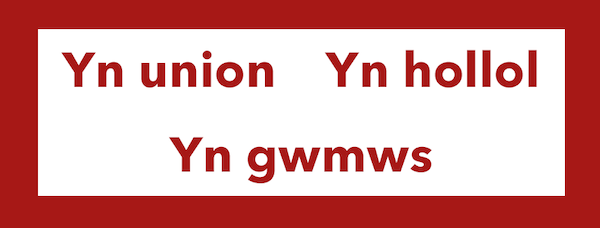
Meaning in English: Exactly!
When we are in complete agreement with someone in English, we tend to respond with the word “exactly.” In Welsh, there are no fewer than three options to choose between: the fairly standard yn union, the northern yn hollol and the southern yn gwmws.
I admit that until I spent a week down in Tresaith, I’d never heard the term yn gwmws before. What a surprise it was the first time I heard it!
- Mae gormod ohonon ni’n byw yma. – Yn hollol / yn gwmws / yn union! = Too many of us live here. – Exactly!
- Beth yn hollol / yn gwmws / yn union wyt ti’n ‘neud? – What exactly are you doing?
7. Bechod!

Meaning in English: What a shame/pity! – OR – How cute/sweet!
When you feel sorry for someone or if something unfortunate happens, there is no better word to express sympathy than “bechod” in Welsh. Keep in mind though that, like in English, you can’t use it in truly awful situations, as you might risk sounding insensitive or insincere. Interestingly it can also be used in the positive sense of “how cute” or “how sweet.”
Other words you might hear to express pity are ‘trueni‘ or ‘biti‘.
Examples:
- Mae Carys wedi colli ei watsh. – O, bechod! = Carys has lost her watch. – Ah, what a shame!
- Mae Johnny eisiau gwneud brecwast yn y gwely i’w fam. – Bechod! – Johnny wants to make breakfast in bed for his mum. – How cute!
8. Go iawn?

Meaning in English: Really? Seriously?
If someone tells you that you’ve won a million pounds on the lottery, your most likely response in Welsh will be “Go iawn?!” This very useful phrase can be used whenever you want to make extra sure that what the other person is saying is true.
When used in a sentence, it translates as “real” or “really” depending on the context.
- Dw i’n disgwyl babi! – Go iawn? = I’m expecting a baby! – Really?
- Wyt ti wedi ffonio’r heddlu go iawn? – Have you really phoned the police?
- Croeso i’r byd go iawn, Dewi. – Welcome to the real world, Dewi.
9. ‘Sdim ots

Meaning in English: It doesn’t matter / X doesn’t mind / X doesn’t care
‘Sdim ots is the shortened version of does dim ots gen i (north) or does dim ots gyda fi (south), both of which literally translate as “there are no odds with me” in English. It takes a little while to get used to this expression but once you’ve got the hang of it, you won’t be able to stop using it!
Examples:
- ‘Sdim ots be’ sy’n digwydd. = I don’t care what happens.
- Mae’r car wedi torri. – ‘Sdim ots. Roedd o’n hen. = The car is broken. – It doesn’t matter. It was old.
10. Diolch byth!
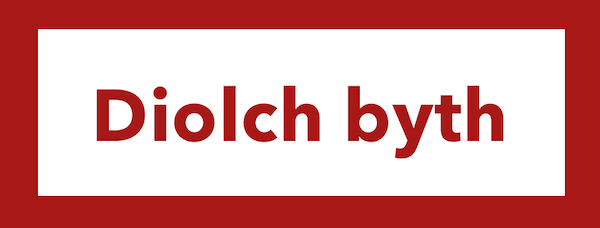
Meaning in English: Thank goodness!
Our final expression is used when you want to express a sense of relief. It literally translates as “thanks forever” in English.
Examples:
- Wnes i ddim archebu pizza gyda phîn-afal. – Ah, diolch byth! = I didn’t order pizza with pinapple. – Ah, thank goodness!
- Diolch byth bod hi’n ddydd Gwener! – Thank goodness it’s Friday!
Can you think of any other words or phrases in Welsh that can help a learner sound like bonafide Welsh speaker? If so, please share them below!

